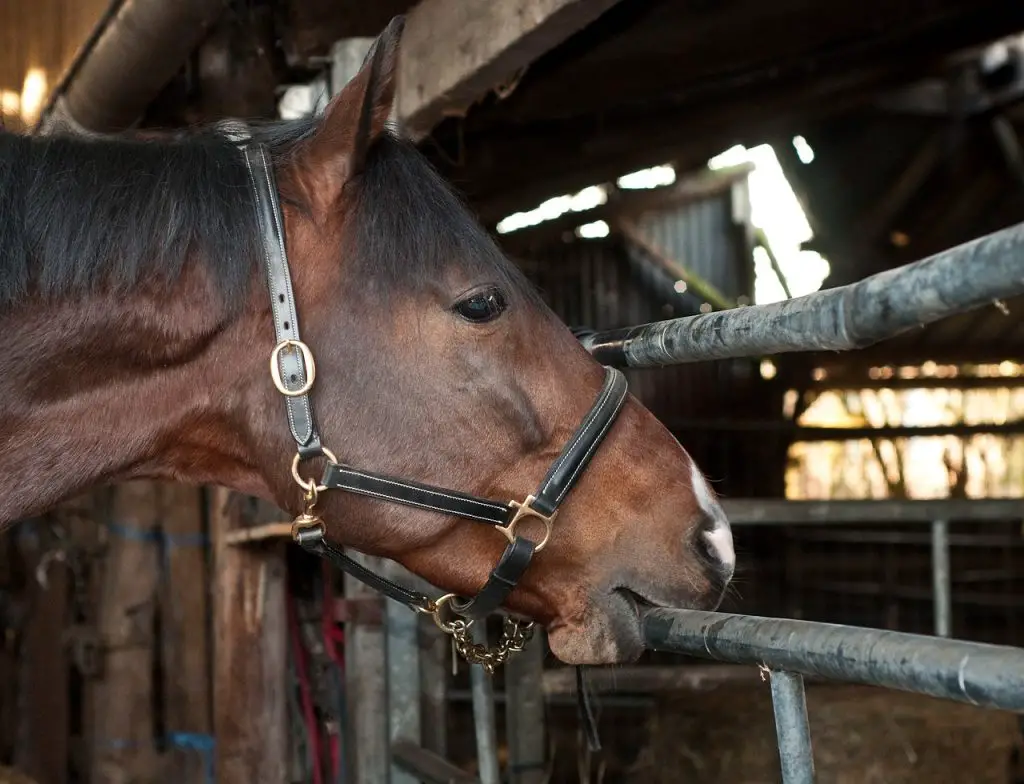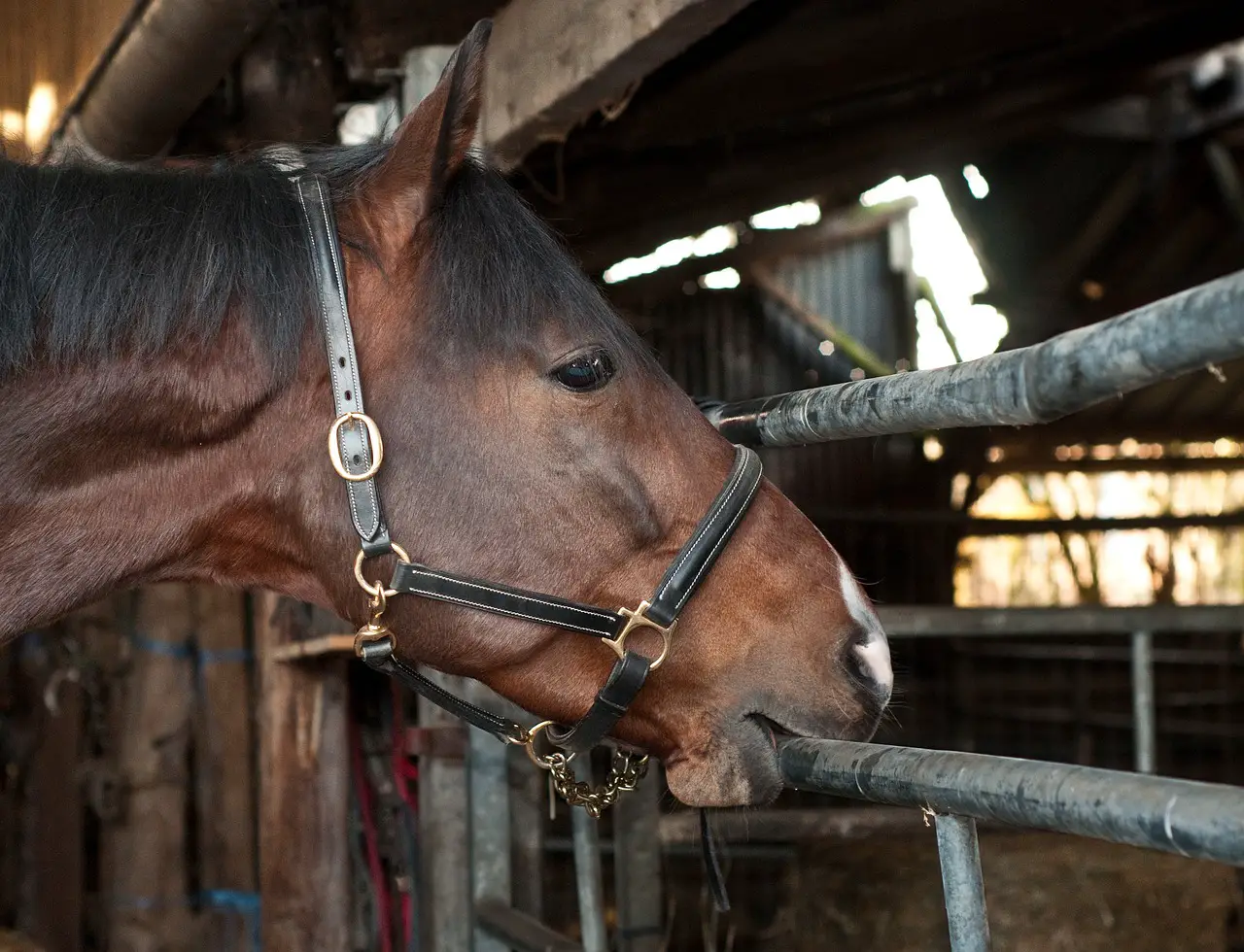Last Updated on February 28, 2022 by Allison Price
Are your horses eating your barn, your stalls and fences? This can cause serious damage to your property and could also pose a health risk for your horse.
Wood chewing is more than a nuisance
Horses should not be eating wood as a part of their diet. Horses who chew on wood surfaces inhaled small pieces and splinters of wood. The small pieces of wood are ingested by horses when they swallow them. The foreign material can cause colic and, in certain cases, puncture the intestinal wall. This could lead to serious health problems.
Wood chewing horse
Boredom and inadequacy of nutrition may be factors that lead to wood-crushing behavior.
(c) AVMA

Also, splinters can get stuck between the teeth of horses or in their gums. It can cause irritation and even infection, much like a popcorn kernel stuck in your teeth.
A horse’s oral structure and teeth can also be damaged by wood chewing. Horses’ teeth can wear over their lifetime from eating processed feeds and roughage. Chewing wood excessively damages the incisors, reducing the horse’s ability properly to chew and digest food. Poor tooth surfaces can impact the horse’s ability to maintain a healthy weight. If left unattended, it can reduce the horse’s lifespan.
Wood chewing is not wood eating
Understanding why horses chew wood is important in order to understand the differences between cribbing and wood sucking.
Cribbing is the act of grabbing a stable surface with its teeth (stall wall, barn walls, fences, etc.) and sucking in air. Cribbing horses aren’t as destructive to stables but they can leave a hole in the surface that they grab before sucking air into their windpipes. Cribbing is considered a vice in the stable and can be a sign that the horse has stomach ulcers, or colic.
Wind sucking, a closely related behavior, allows horses to take air into their windpipes without having to clamp onto a hard surface. Research has shown that horses may crib or suck wind in order to release endorphins.
Wood chewers are sometimes called beavers because they eat the bark from trees as well as the wood structures that make up their barn, paddock, and stall. It is frustrating, and it is expensive to maintain.
What is the reason horses chew wood?
Three major factors are often linked to wood chewing:
- Boredom and frustration
- Nutritional deficiencies
- Habit
Boredom
Horses are grazing animals. Their systems work best when they are fed according to a natural pattern. Horses used to spend a lot of their time foraging for food, hay and legumes before they were domesticated. Horses today are restricted to a small paddock or stall and must eat processed feeds. Sometimes, this can lead to boredom and frustration as horses are forced to live an “unnatural” lifestyle.
Horses can enjoy small amounts of hay all day by having easy access to small amounts of hay. Horses may turn to wood if long-stemmed, chewy grass or hay isn’t available during the day to satisfy their natural desire to chew.
Boredom can be relieved by turning out, particularly if there is ample grazing. Regular turnout may be impossible due to injury or lack of land. If larger paddocks cannot be found, give the horse time in the stall every day to relieve boredom and release frustration.
Sprays and pastes can be applied directly on horse’s chewing surfaces. The solution can be washed off with regular rains, but some horses will not be deterred. Some horses find it hard to chew on the areas they love, but hot chili sauce can encourage them to do so.
Dry Irish Spring soap is said to be able to remove the smell and taste from wood-choking horses. It can also cure foul-mouthed children who use the soap.
Sprays, pastes and soaps that are foul-tasting do not discourage wood chewers. To discourage them, wrap trees with plastic mesh and place metal caps on fence posts.
Nutritional Deficiencies
A horse that chews wood may be suffering from a lack of certain nutrients. Consult your veterinarian if you suspect that the horse may have a nutritional problem. A blood test will determine if the horse has a deficiency in minerals. To correct the problem, supplements can be added to daily feed rations.
According to the results of the bloodwork, it may be necessary to supplement the horse’s diet with commercial products. Talk to your veterinarian about all options and ask questions about specific mineral deficiencies. There may be cheaper, household alternatives available that could be used instead of purchasing commercially produced products.
Wood chewers can develop ulcers in some cases. Ask your veterinarian for a complete physical if the blood work is in order and the horse has been given regular turnout and plenty of forage. This will rule out any medical issues that may need to be addressed.
Don’t despair
Wood chewers can be frustrating for both horse owners and stable owners. Wood chewers may require more attention but can be managed with some effort. The veterinarian can give medication or supplements to stop a horse from chewing wood. If the horse’s behavior is a result of boredom or habit then remove or cover as much wood as you can. If all else fails, consult a veterinarian or trainer to determine whether a grazing mozzle is an option.


